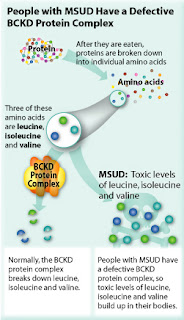How MSUD is Treated
Treatment involved dietary restriction of the amino acids leucine, isoleucine, and valine. This treatment must begin very early to prevent brain damage. Babies with the disease must eat a special formula that does not contain the amino acids leucine, isoleucine, and valine. As the person grows to adulthood, he or she must always watch their diet, avoiding high protein foods such as meat, eggs, and nuts.
If levels of the three amino acids still get too high, patients can be treated with an intravenous (given through a vein) solution that helps the body use up excess leucine, isoleucine, and valine for protein synthesis.
Gene therapy is also a potential future treatment for patients with MSUD. This would involve replacing the mutated gene with a good copy, allowing the patient's cells to generate a functional BCKD protein complex and break down the excess amino acids.
How Doctors Diagnose MSUD
In some states, all babies are screened for MSUD within 24 hours after birth. A blood sample taken from the baby's heel is analyzed for high leucine levels.
Symptoms of MSUD
A baby who has the disorder may appear normal at birth. But within three to four days, the symptoms appear. These may include: loss of appetite, fussiness, and sweet-smelling urine. The elevated levels of amino acids in the urine generate the smell, which is reminiscent of maple syrup. This is how MSUD got its name. If left untreated, the condition usually worsens. The baby will have seizures, go into a coma, and die within the first few months of life.
How is MSUD Inhereted?
MSUD is inherited in an autosomal recessive pattern. For a child to get the disease, he or she must inherit the gene from each parent. If both parents carry the MSUD gene, each of their children has a 25 percent chance of getting the disorder, and a 50 percent chance of being a carrier.
What is MSUD?
MSUD is a potentially deadly disorder that affects the way the body breaks down three amino acids, leucine, isoleucine, and valine. When they're not being used to build a protein, these three amino acids can be either be recycled or broken down and used for energy. They are normally broken down by six proteins that act as a team and form a complex called BCKD (branched-chain alpha-ketoacid dehydrogenase).
People with MSUD have a mutation that results in a deficiency for one of the 6 proteins that make up this complex. Therefore, they can't break down leucine, isoleucine, and valine. They end up with dangerously high levels of these amino acids in their blood, causing the rapid degeneration of brain cells and death if left untreated.





No comments:
Post a Comment